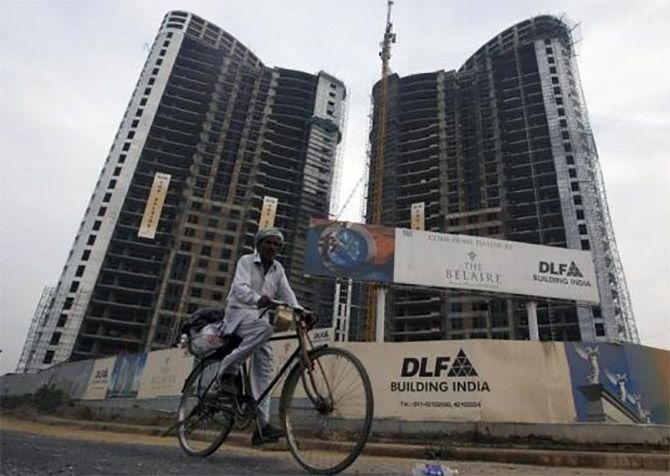 In the latest sign of the crisis facing real estate companies, Gurgaon-based DLF has launched a mega discount sale of its properties, believed to be its largest so far, in cities across the country to drum up interest.
In the latest sign of the crisis facing real estate companies, Gurgaon-based DLF has launched a mega discount sale of its properties, believed to be its largest so far, in cities across the country to drum up interest.
The company is offering discounts in 16 projects across Delhi, Bengaluru, Chennai, Kochi, Lucknow, Panchkula, Bhubaneswar, Kasauli and New Chandigarh as part of its DLF Spring Festival that will end on March 31.
Developers began cutting prices about two years ago to revive flagging sales in order to beat the slowdown and generate cash flows that had dried up after banks piped down funding to the sector. However, DLF had refused to follow suit, say brokers.
Among the properties that will be subsidised include two luxury projects in New Delhi, the Queen's Court and the King's Court.
After the discount, a house here, which carries a price tag between Rs 12.16 crore and Rs 36.35 crore, will cost Rs 34-36 lakh less, according to information on the company's site.
"Discounts are 1 per cent of the total property value," says a DLF spokesperson, adding that the company had undertaken such initiatives even in the past.
In an email reply to queries sent by Business Standard, DLF says that as customers usually postpone home-buying to the new financial year, it had decided to approach potential buyers directly through online platforms.
"We have offered an online purchase platform for a limited period through Snapdeal for select units. We have also started offering possession to buyers in townships in Chennai, Bengaluru, Kolkata, New Chandigarh, Indore, among others. This initiative could help in attracting end users to the ready-to-move houses and the soon-to-be-ready properties," the spokesperson adds.
Apart from the slowing market, DLF's recent run-ins with the Competition Commission of India may have also prompted it to take the freebie route to boost sales.
Last year, DLF was penalised by the competition regulator for allegedly abusing its dominant position by imposing "unfair and discriminatory" terms on its buyers in several of its projects.
The case is now being heard in the Supreme Court, but DLF had to deposit the penalty amount of Rs 630 crore (Rs 6.3 billion) with the court during pendency of the litigation. In February, two fresh probes were ordered by CCI against DLF involving its Skycourt and RegalGardens projects in Gurgaon.
The legal hassles and the accompanying expenses don't bode well for a company that is struggling to pare its debt of Rs 20,336 crore (Rs 203.36 billion) as on December 2014. To be sure, a number of realty players have got into trouble with the law in recent years.
Noida-based Supertech is fighting an appeal in the Supreme Court against an Allahabad High Court order to demolish two 40-storey towers in a Noida housing project, while Parsvnath was recently directed by a consumer forum to pay Rs 7 lakh to a buyer for unfair trade practices.
DLF's troubles, though, seem more deeply entrenched. Its options to raise money was severely curtailed after market regulator Sebi banned the company and its promoters from accessing the capital market for three years last year because of irregularities in its initial public offering in 2007.
While the Securities Appellate Tribunal reduced the Sebi ban to six months last week, its problems are unlikely to end soon.
The company has been reeling under huge debts and is on a divestment spree to generate cash and focus on its core business of real estate.
Plans are also afoot to launch REITs to reduce the debt of its rental arm and raise over Rs 3,000 crore (Rs 30 billion) through divestment or joint ventures in certain projects.
"The value of deals in the pipeline exceeds Rs 3,000 crore (Rs 30 billion). We are also in dialogue with a few private equity players for part cash-out in some marquee projects before launching them in FY'16," DLF told analysts at a presentation.
For the third quarter ended December 2014, DLF posted a 9 per cent decline in net profit. Income from operations too fell 5 per cent compared to the same quarter in the previous year. With income sliding and debts mounting, the road to recovery may be a long one.











